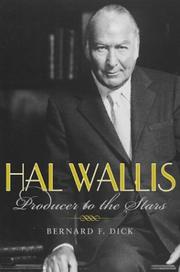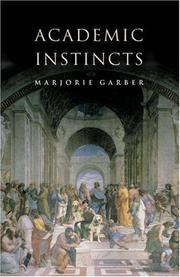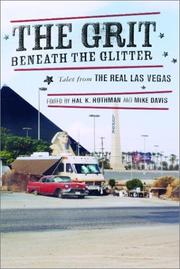| Listing 1 - 10 of 13 | << page >> |
Sort by
|
Book
ISBN: 1476626766 9781476626765 9781476666457 1476666458 Year: 2017 Publisher: Jefferson, North Carolina
Abstract | Keywords | Export | Availability | Bookmark
 Loading...
Loading...Choose an application
- Reference Manager
- EndNote
- RefWorks (Direct export to RefWorks)
"Hal Trosky played first base for the Cleveland Indians during the Great Depression. His career stretched from the heyday of Babe Ruth through the end of World War II. Drawing on family archives and exhaustive research, this first ever biography of Trosky covers his early years in Iowa, his Major League career and his post-baseball life"--
Book
ISBN: 0231850840 Year: 2016 Publisher: New York, NY : Columbia University Press,
Abstract | Keywords | Export | Availability | Bookmark
 Loading...
Loading...Choose an application
- Reference Manager
- EndNote
- RefWorks (Direct export to RefWorks)
Over the course of nearly thirty years, Hal Hartley has cultivated a reputation as one of America's most steadfastly independent film directors. From his breakthrough films - The Unbelievable Truth (1989), Trust (1990), and Simple Men (1992) - to his recently completed 'Henry Fool' trilogy, Hartley has honed a rigorous, deadpan, and instantly recognizable film style informed by both European modernism and playful revisions of Classical Hollywood genres. Featuring new essays on this important director and his films, this collection explores Hartley's work from a variety of aesthetic, cultural, and economic contexts, while also looking closely at his collaborations with actors, the contexts of his authorial reputation, his reworking of the romantic comedy and other genres, and the shifting economics of his filmmaking.This book, up-to-date through Hartley's latest film, Ned Rifle (2014), includes new scholarship on the director's early work as well as reflections on his cinema in connection with new theories and approaches to independent filmmaking. Covering the entire trajectory of his career, including both his features and short films, the book also includes new readings of several of Hartley's seminal films, including Amateur (1994), Flirt (1995), and Henry Fool (1997).
Book
ISBN: 081433542X 9780814335420 9780814334157 0814334156 Year: 2009 Publisher: Detroit Wayne State University Press
Abstract | Keywords | Export | Availability | Bookmark
 Loading...
Loading...Choose an application
- Reference Manager
- EndNote
- RefWorks (Direct export to RefWorks)
Book
ISBN: 128295962X 9786612959622 0252093038 9780252093036 9780252077913 0252077911 9780252035951 025203595X 025203595X 9780252035951 Year: 2011 Publisher: Urbana, Ill. University of Illinois Press
Abstract | Keywords | Export | Availability | Bookmark
 Loading...
Loading...Choose an application
- Reference Manager
- EndNote
- RefWorks (Direct export to RefWorks)
This work examines a director whose work shrewdly eschews cinematic realism. The author makes a compelling, succinct argument for the importance of Hal Hartley's work and its engagement with cinematic realism.
Hartley, Hal, --- Rifle, Ned --- Criticism and interpretation. --- Motion picture producers and directors --- Hartley, Hal

ISBN: 0813159512 9780813159515 1322597391 9781322597393 0813123178 9780813123172 0813187761 Year: 2015 Publisher: Lexington The University Press of Kentucky
Abstract | Keywords | Export | Availability | Bookmark
 Loading...
Loading...Choose an application
- Reference Manager
- EndNote
- RefWorks (Direct export to RefWorks)
Hal Wallis might not be as well known as David O. Selznick or Samuel Goldwyn, but the films he produced -- Casablanca, Jezebel, Now Voyager, The Life of Emile Zola, Becket, True Grit, and many other classics (as well as scores of Elvis movies) -- have certainly endured. As producer of numerous films, Wallis made an indelible mark on the course of America's film industry, but his contributions are often overlooked and no full-length study has yet assessed his incredible career.A former office boy and salesman, Wallis first engaged with the business of film as the manager of a Los Angeles movie
Motion picture producers and directors --- Wallis, Hal B., --- Wallis, Harold Brent, --- Wallis, Hal,
Book
ISBN: 9780803299665 0803299664 9780803299399 0803299397 Year: 2016 Publisher: Lincoln
Abstract | Keywords | Export | Availability | Bookmark
 Loading...
Loading...Choose an application
- Reference Manager
- EndNote
- RefWorks (Direct export to RefWorks)
Baseball players --- Baseball --- Base-ball --- Ball games --- Betting --- History. --- Chase, Hal, --- Chase, Harold,
Book
ISBN: 1608337685 9781608337682 9781626983021 162698302X 9781626983779 1626983771 Year: 2018 Publisher: Maryknoll, New York
Abstract | Keywords | Export | Availability | Bookmark
 Loading...
Loading...Choose an application
- Reference Manager
- EndNote
- RefWorks (Direct export to RefWorks)
"James H. Cone is widely recognized as the founder of Black Liberation Theology. With these works he established himself as one of the most prophetic and challenging voices of our time. In this powerful and passionate memoir--his final work--Cone describes the obstacles he overcame to find his voice, to respond to the signs of the times, and to offer a voice for those--like the parents who raised him in Bearden, Arkansas in the era of lynching and Jim Crow--who had no voice. Recounting lessons learned both from critics and students, and the ongoing challenge of his models King, Malcolm X, and James Baldwin, he describes his efforts to use theology as a tool in the struggle against oppression and for a better world."--Provided by publisher
Theologians --- Black theology --- History of doctrines. --- Cone, James H. --- African American theology --- African Americans --- Black people --- Theology, Doctrinal --- Religion --- Cone, James Hal --- 241.1*35 --- 241.1*31 --- 241.1*35 Black theology --- 241.1*31 Politieke theologie. Bevrijdingstheologie. Ethiek van de revolutie --- Politieke theologie. Bevrijdingstheologie. Ethiek van de revolutie --- History of doctrines

ISBN: 069104970X 0691115710 1282665642 140081426X 1400824672 9786612665646 9781400814268 9781400824670 9781282665644 9780691049700 9780691115719 Year: 2001 Publisher: Princeton ; Oxfordshire Princeton University Press
Abstract | Keywords | Export | Availability | Bookmark
 Loading...
Loading...Choose an application
- Reference Manager
- EndNote
- RefWorks (Direct export to RefWorks)
In this lively and provocative book, cultural critic Marjorie Garber, who has written on topics as different as Shakespeare, dogs, cross-dressing, and real estate, explores the pleasures and pitfalls of the academic life. Academic Instincts discusses three of the perennial issues that have surfaced in recent debates about the humanities: the relation between "amateurs" and "professionals," the relation between one academic discipline and another, and the relation between "jargon" and "plain language." Rather than merely taking sides, the book explores the ways in which such debates are essential to intellectual life. Garber argues that the very things deplored or defended in discussions of the humanities cannot be either eliminated or endorsed because the discussion itself is what gives humanistic thought its vitality. Written in spirited and vivid prose, and full of telling detail drawn both from the history of scholarship and from the daily press, Academic Instincts is a book by a well-known Shakespeare scholar and prize-winning teacher who offers analysis rather than polemic to explain why today's teachers and scholars are at once breaking new ground and treading familiar paths. It opens the door to an important nationwide and worldwide conversation about the reorganization of knowledge and the categories in and through which we teach the humanities. And it does so in a spirit both generous and optimistic about the present and the future of these disciplines.
Academic writing --- Humanities --- Learning and scholarship --- Literature --- Universities and colleges --- 378.4 --- 378.4 Universiteiten --- Universiteiten --- Academic disciplines --- Disciplines, Academic --- Schools --- Erudition --- Scholarship --- Civilization --- Intellectual life --- Education --- Learned institutions and societies --- Research --- Scholars --- Classical education --- Learned writing --- Scholarly writing --- Authorship --- Philosophy --- Study and teaching (Higher) --- Curricula --- Learning and scholarship. --- Philosophy. --- Study and teaching (Higher). --- Curricula. --- Academic writing. --- Sciences humaines --- Littérature --- Enseignement universitaire --- Ecriture savante --- Savoir et érudition --- Etude et enseignement (Supérieur) --- Programmes d'études --- Philosophie --- Adjective. --- Aestheticism. --- Alan Sokal. --- Alfred Kazin. --- Amateur professionalism. --- Amateur. --- American studies. --- Anti-intellectualism. --- Aphorism. --- Art history. --- Author. --- Book review. --- C. P. Snow. --- C. S. Lewis. --- Columnist. --- Counterintuitive. --- Critical theory. --- Criticism. --- Cultural studies. --- Culture war. --- Deconstruction. --- Doublespeak. --- Edward Said. --- Essay. --- Fashionable Nonsense. --- Genre. --- George Orwell. --- Gertrude Stein. --- Harvard University. --- Headline. --- Humanities. --- Idealization. --- Ideology. --- Intellectual. --- Interdisciplinarity. --- Irony. --- Jacques Derrida. --- Jacques Lacan. --- James Gleick. --- Jargon. --- Jewish studies. --- Jonathan Swift. --- Joseph Addison. --- Judith Butler. --- Liberal arts education. --- Literary criticism. --- Literary theory. --- Literature. --- Mario Pei. --- Minima Moralia. --- Modern Language Association. --- Mr. --- Neologism. --- New Criticism. --- Newspeak. --- Novelist. --- Oxford University Press. --- Penis envy. --- Philosopher. --- Phrase. --- Physicist. --- Poetry. --- Political correctness. --- Politician. --- Post-structuralism. --- Postmodernism. --- Prince Hal. --- Psychoanalysis. --- Psychology. --- Rhetoric. --- Richard Feynman. --- Robert Maynard Hutchins. --- Roland Barthes. --- Romanticism. --- Science. --- Scientist. --- Sigmund Freud. --- Slang. --- Social science. --- Sociology. --- Sokal affair. --- Sophistication. --- Stanley Fish. --- Terminology. --- The New York Times. --- The Philosopher. --- The School of Athens. --- The Two Cultures. --- Theodor W. Adorno. --- Theory. --- Thought. --- Usage. --- Verb. --- Vocabulary. --- Wendy Lesser. --- Wilhelm Dilthey. --- William Shakespeare. --- Writer. --- Writing.

ISBN: 0520935454 1282762419 9786612762413 1597346438 9780520935457 1417525347 9781417525348 9781597346436 0520205294 9780520205291 0520225384 9780520225381 Year: 2001 Publisher: Berkeley, Calif. University of California Press
Abstract | Keywords | Export | Availability | Bookmark
 Loading...
Loading...Choose an application
- Reference Manager
- EndNote
- RefWorks (Direct export to RefWorks)
The Grit Beneath the Glitter is the first real look at the new Las Vegas from the inside. In it, long-time residents as well as professionals reflect on the transformation of one of the fastest-growing and most famous cities on earth, yet one about which relatively little is known. They offer a lively and compelling portrait of the other side of Las Vegas: the people and institutions that support the glitter of the gaming and entertainment industry. Examining a range of topics--from the city's commercial history, labor conditions, and environmental problems to an analysis of the famous lights of the Strip--the contributors uncover the contradictions between the illusion and the reality of the city, the seam between fantasy and the life it masks. The essays in this collection explore the world that employees experience when they enter gaming palaces from an employee entrance in a back parking lot rather than through the scripted doors of casino/hotel palaces. They take readers into the neighborhoods where 1.4 million Americans now live, attend school, eat dinner, and go to work.
HISTORY / United States / State & Local / West (AK, CA, CO, HI, ID, MT, NV, UT, WY). --- Las Vegas (Nev.) --- Las Vegas, Nev. --- City of Las Vegas (Nev.) --- Vegas (Nev.) --- Las-Veqas (Nev.) --- Горад Лас-Вегас (Nev.) --- Horad Las-Vehas (Nev.) --- Лас-Вегас (Nev.) --- Las-Vehas (Nev.) --- Naʼazhǫǫsh Hátsoh (Nev.) --- Λας Βέγκας (Nev.) --- Las Venkas (Nev.) --- Lasvegaso (Nev.) --- 라스베이거스 (Nev.) --- Lasŭ Peigŏsŭ (Nev.) --- 라스 베이거스 (Nev.) --- לאס וגאס (Nev.) --- Campi (Nev.) --- Lasvegasa (Nev.) --- Las Vegasas (Nev.) --- ラスベガス (Nev.) --- Rasu Begasu (Nev.) --- לאס וועגאס (Nev.) --- 拉斯维加斯 (Nev.) --- Lasi Weijiasi (Nev.) --- Lasiweijiasi (Nev.) --- Clark's Las Vegas Townsite (Las Vegas, Nev.) --- History --- Social conditions --- Economic conditions --- Sociology of culture --- Las Vegas --- academic. --- casino workers. --- casino. --- culinary. --- drought. --- essay anthology. --- essay collection. --- global. --- hal rotham. --- jon christensen. --- kit miller. --- las vegas strip. --- las vegas. --- mike davis. --- nevada. --- noir. --- norman klein. --- peter goin. --- political economy. --- politics. --- power. --- race issues. --- race. --- racial issues. --- racism. --- regional history. --- regional. --- scholarly. --- sex workers. --- sin city. --- unions. --- urbanization. --- water. --- Las Vegas [Nevada]

ISBN: 140081426X 1282665642 9786612665646 1400824672 9781400814268 9781400824670 9781282665644 069104970X 9780691115719 9780691049700 069104970X Year: 2009 Publisher: Princeton, NJ
Abstract | Keywords | Export | Availability | Bookmark
 Loading...
Loading...Choose an application
- Reference Manager
- EndNote
- RefWorks (Direct export to RefWorks)
In this lively and provocative book, cultural critic Marjorie Garber, who has written on topics as different as Shakespeare, dogs, cross-dressing, and real estate, explores the pleasures and pitfalls of the academic life. Academic Instincts discusses three of the perennial issues that have surfaced in recent debates about the humanities: the relation between "amateurs" and "professionals," the relation between one academic discipline and another, and the relation between "jargon" and "plain language." Rather than merely taking sides, the book explores the ways in which such debates are essential to intellectual life. Garber argues that the very things deplored or defended in discussions of the humanities cannot be either eliminated or endorsed because the discussion itself is what gives humanistic thought its vitality. Written in spirited and vivid prose, and full of telling detail drawn both from the history of scholarship and from the daily press, Academic Instincts is a book by a well-known Shakespeare scholar and prize-winning teacher who offers analysis rather than polemic to explain why today's teachers and scholars are at once breaking new ground and treading familiar paths. It opens the door to an important nationwide and worldwide conversation about the reorganization of knowledge and the categories in and through which we teach the humanities. And it does so in a spirit both generous and optimistic about the present and the future of these disciplines.
Learning and scholarship. --- Humanities --- Academic writing. --- Universities and colleges --- Literature --- Learning and scholarship --- Classical education --- Erudition --- Scholarship --- Civilization --- Intellectual life --- Education --- Research --- Scholars --- Learned writing --- Scholarly writing --- Authorship --- Academic disciplines --- Disciplines, Academic --- Schools --- Philosophy. --- Curricula. --- Study and teaching (Higher) --- Curricula --- Adjective. --- Aestheticism. --- Alan Sokal. --- Alfred Kazin. --- Amateur professionalism. --- Amateur. --- American studies. --- Anti-intellectualism. --- Aphorism. --- Art history. --- Author. --- Book review. --- C. P. Snow. --- C. S. Lewis. --- Columnist. --- Counterintuitive. --- Critical theory. --- Criticism. --- Cultural studies. --- Culture war. --- Deconstruction. --- Doublespeak. --- Edward Said. --- Essay. --- Fashionable Nonsense. --- Genre. --- George Orwell. --- Gertrude Stein. --- Harvard University. --- Headline. --- Humanities. --- Idealization. --- Ideology. --- Intellectual. --- Interdisciplinarity. --- Irony. --- Jacques Derrida. --- Jacques Lacan. --- James Gleick. --- Jargon. --- Jewish studies. --- Jonathan Swift. --- Joseph Addison. --- Judith Butler. --- Liberal arts education. --- Literary criticism. --- Literary theory. --- Literature. --- Mario Pei. --- Minima Moralia. --- Modern Language Association. --- Mr. --- Neologism. --- New Criticism. --- Newspeak. --- Novelist. --- Oxford University Press. --- Penis envy. --- Philosopher. --- Phrase. --- Physicist. --- Poetry. --- Political correctness. --- Politician. --- Post-structuralism. --- Postmodernism. --- Prince Hal. --- Psychoanalysis. --- Psychology. --- Rhetoric. --- Richard Feynman. --- Robert Maynard Hutchins. --- Roland Barthes. --- Romanticism. --- Science. --- Scientist. --- Sigmund Freud. --- Slang. --- Social science. --- Sociology. --- Sokal affair. --- Sophistication. --- Stanley Fish. --- Terminology. --- The New York Times. --- The Philosopher. --- The School of Athens. --- The Two Cultures. --- Theodor W. Adorno. --- Theory. --- Thought. --- Usage. --- Verb. --- Vocabulary. --- Wendy Lesser. --- Wilhelm Dilthey. --- William Shakespeare. --- Writer. --- Writing.
| Listing 1 - 10 of 13 | << page >> |
Sort by
|

 Search
Search Feedback
Feedback About UniCat
About UniCat  Help
Help News
News